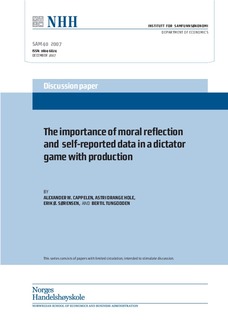| dc.contributor.author | Cappelen, Alexander W. | |
| dc.contributor.author | Hole, Astri Drange | |
| dc.contributor.author | Sørensen, Erik Ø. | |
| dc.contributor.author | Tungodden, Bertil | |
| dc.date.accessioned | 2008-08-28T08:04:57Z | |
| dc.date.available | 2008-08-28T08:04:57Z | |
| dc.date.issued | 2007-12 | |
| dc.identifier.issn | 0804-6824 | |
| dc.identifier.uri | http://hdl.handle.net/11250/163134 | |
| dc.description.abstract | This paper studies how individual behavior is affected by moral reflection
in a dictator game with production, and the informational value
of self-reported data on fairness. We find that making individuals reflect on fairness before they play the dictator game has a moderate effect on
the weight attached to fairness in distributive choices, and a strong effect on what people consider fair. Furthermore, we find that self-reported
data have substantial informational value, but still do not add explanatory
power to a random utility model estimated on purely behavioral data. Finally, by studying the behavior of individuals who deviate from their self-reported fairness ideal, we do not find much support for the hypothesis
that people are self-serving in their choice of fairness ideal. | en |
| dc.language.iso | eng | en |
| dc.publisher | Norwegian School of Economics and Business Administration. Department of Economics | en |
| dc.relation.ispartofseries | Discussion paper | en |
| dc.relation.ispartofseries | 2007:40 | en |
| dc.subject | dictator game | en |
| dc.subject | distributive justice | en |
| dc.subject | experimental data | en |
| dc.subject | fairness | en |
| dc.subject | moral reflection | en |
| dc.subject | self-serving bias | en |
| dc.subject | survey data | en |
| dc.title | The importance of moral reflection and self-reported data in a dictator game with production | en |
| dc.type | Working paper | en |
| dc.subject.nsi | VDP::Samfunnsvitenskap: 200::Økonomi: 210::Samfunnsøkonomi: 212 | en |
